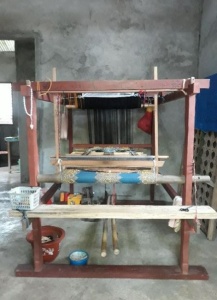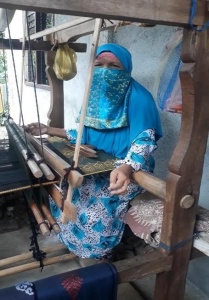The COVID-19 pandemic is not only a historic global health crisis but has also posed a continuing threat to the livelihood of many Filipinos. Countless establishments, since the beginning of the health crisis, have been negatively affected, even worse, small and macro enterprises had to close.
Baingkong Samad Salik’s business is among the industries in the autonomous region which has been greatly affected. Since the beginning of the pandemic, the demand for her woven products has decreased, hence, she was not able to sustain the operations of her business.
These woven products, such as malong, gowns, barong, polo, and trousers, among others, are just some of the fruits of a time-honored weaving tradition of the Maguindanao people called, Inaul.
The Inaul weaving industry is one of the province’s major earners until the pandemic came and many of the weavers, including Baingkong, had to find ways to at least recover from its socio-economic effects.
Assistance to small businesses
 As part of the efforts of the Department of Social Welfare and Development (DSWD), being the lead agency in social protection, to help ease the effects of the pandemic to the marginalized, it has implemented the Livelihood Assistance Grant through the Sustainable Livelihood Program. Biangkong is among the recipients of Php 15,000 cash assistance which she used to recover her small business.
As part of the efforts of the Department of Social Welfare and Development (DSWD), being the lead agency in social protection, to help ease the effects of the pandemic to the marginalized, it has implemented the Livelihood Assistance Grant through the Sustainable Livelihood Program. Biangkong is among the recipients of Php 15,000 cash assistance which she used to recover her small business.
She used the aid to purchase materials such as thread, a weaving machine, textiles, and tools that she needed to operate her Inaul Weaving Business. In February, she finally started again selling her woven products.
“Banginsukor ako sa natalima ko ah kapital siya ganat sa lekano (DSWD-SLP), ka nakapaluman ako mag-inaul endo masla inya tabang salekami ah pamilya,” Biangkong said.
At first, she was bringing her crafts when going to her Arabic Class so she could sell some of them. As the days passed by, her daughter also learned to weave and now helps her in selling their products online.
Selling traditional products in a modern way
 Due to mobility restrictions, their marketing strategies became limited. Thanks to her digital savvy daughter, Baingkong was able to promote her woven products online. Her craftsmanship and handmade creations attract netizens to patronize Inaul products. Most of her clients belong to high-profile people from the province of Maguindanao and Cotabato City.
Due to mobility restrictions, their marketing strategies became limited. Thanks to her digital savvy daughter, Baingkong was able to promote her woven products online. Her craftsmanship and handmade creations attract netizens to patronize Inaul products. Most of her clients belong to high-profile people from the province of Maguindanao and Cotabato City.
With the help of social media, they could still sell and receive orders online. Social media created fanatics of ‘Inaul’ who love the products of Maguindanao people.
Biangkong was among many Filipinos who have been challenged by the pandemic, yet was able to survive with the help of the assistance she received from the government and now weaving her life for the better. ###


